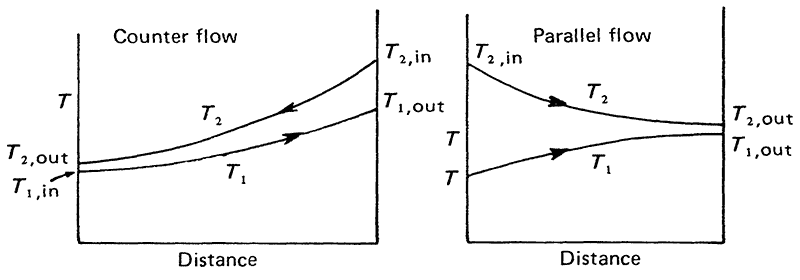Content Map
Types of temperature change pattern
DOI 10.1615/hedhme.a.000090
1.1 DESCRIPTION OF HEAT EXCHANGER TYPES
1.1.3 Types of Temperature Change Pattern
D. Brian Spalding
A. SINGLE-PHASE HEAT EXCHANGERS
In a large proportion of the heat exchangers encountered in practice, each fluid stream leaves in the same phase state as that in which it entered (a gas leaves as a gas, a liquid as a liquid). The result is that, as heat is transferred from the hotter fluid to the cooler one, the former temperature diminishes while the latter rises.
Often the temperature change is proportional to the heat transferred. This is the case most commonly analyzed (see, for example, Section 100).
Figure 1 illustrates the temperature changes that occur in the two streams along the length of heat exchangers of counterflow and parallel-flow configuration. Evidently, it is possible in the former case for the outlet temperature of one of the streams to approach closely the inlet temperature of the other; the best that can occur in the case of parallel-flow exchangers is that the two outlet temperatures may be close together.

Figure 1 Temperature-distribution diagrams for counterflow and parallel-flow heat exchangers.
... You need a subscriptionOpen in a new tab. to view the full text of the article. If you already have the subscription, please login here